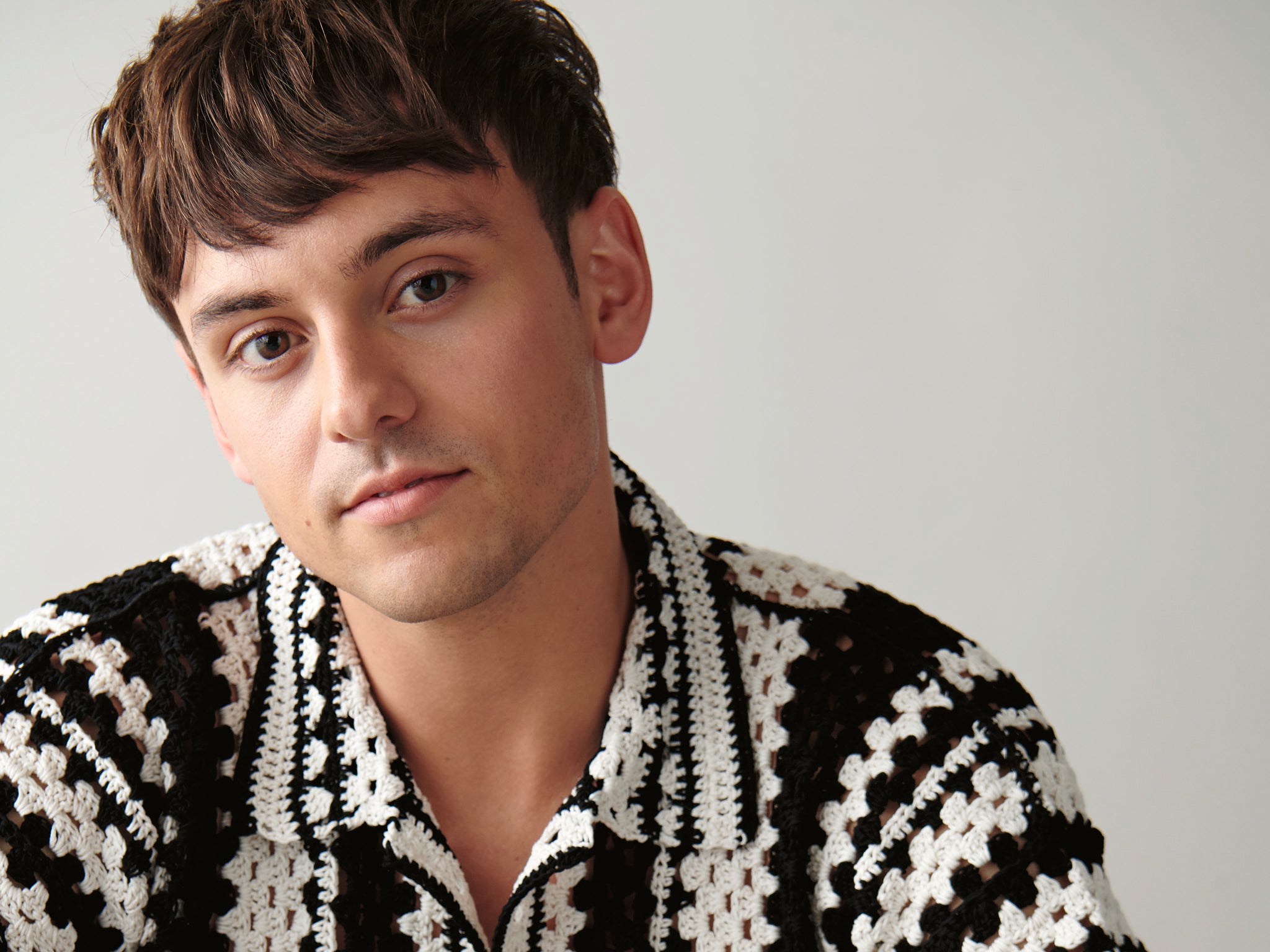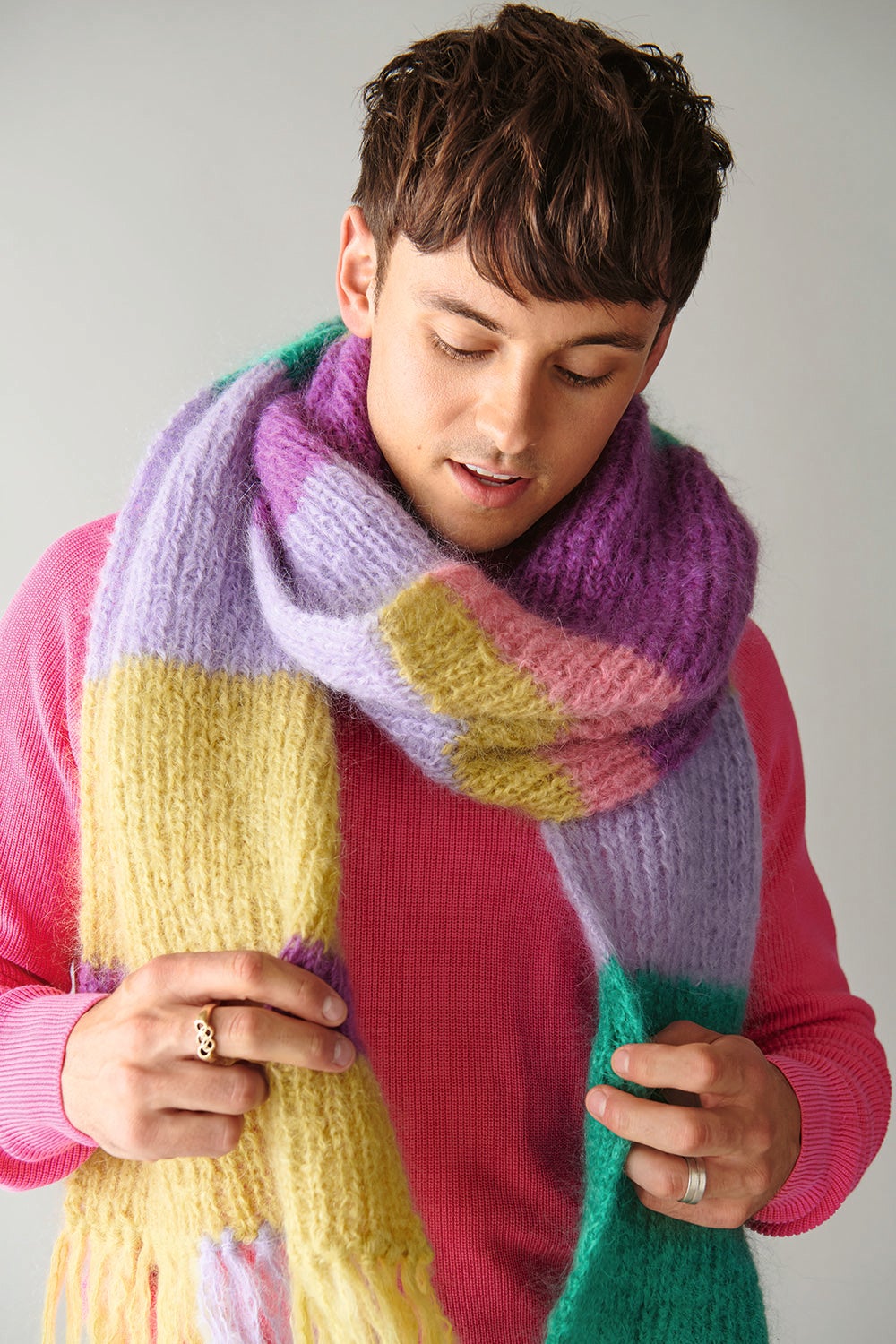Tom Daley: ‘If I was told I couldn’t compete because of who I was, I’d never have tried’
Britain’s Olympic diving gold medalist has written a book about knitting and is contemplating whether to leave the pool behind. He talks to Sam Fishwick about the decision to ban transgender athletes from competing in women’s diving, and hosting the World Cup in a country that oppresses LGBT people


Your support helps us to tell the story
From reproductive rights to climate change to Big Tech, The Independent is on the ground when the story is developing. Whether it's investigating the financials of Elon Musk's pro-Trump PAC or producing our latest documentary, 'The A Word', which shines a light on the American women fighting for reproductive rights, we know how important it is to parse out the facts from the messaging.
At such a critical moment in US history, we need reporters on the ground. Your donation allows us to keep sending journalists to speak to both sides of the story.
The Independent is trusted by Americans across the entire political spectrum. And unlike many other quality news outlets, we choose not to lock Americans out of our reporting and analysis with paywalls. We believe quality journalism should be available to everyone, paid for by those who can afford it.
Your support makes all the difference.If anyone wants to know what the worst thing about diving is, it’s getting wet,” says Tom Daley, dispensing the sort of twist you’d usually expect from him in the synchronised 10 metres. “Like, every day just getting cold and wet. I know that’s part of the job, but that’s the worst thing.”
Daley is talking to me via Zoom from his tasteful south London kitchen (all reclaimed wood and jaunty fridge magnet souvenirs from his travels around the world), which he shares with his husband, the writer and director Dustin Lance Black, and their four-year-old son, Robbie. The 28-year-old is bright-eyed, bushy haired and bouncy, a man utterly relaxed in his own skin.
After finally scooping an Olympic gold at last summer’s Tokyo Olympics, Daley took a year off to pursue what sounds like every passion under the sun. You know him as Britain’s best-loved Olympian. But I’m meeting a quintessential Millennial multi-hyphenate – swimmer/entrepreneur/author – spinning his newfound knitting addiction (you might remember his needles going viral during the Games) into a fashion label, Made with Love, lighting up fashion show front rows from here to Milan in glorious Moschino and Louis Vuitton looks, and generally having a very nice time on dry land.
His new knitting book, Made with Love: Get Hooked with 30 Knitting and Crochet Patterns, hits the shelves on 27 October. Is there anything he won’t try his hand at? “I don’t have a fragrance,” he says. “It would have to be Eau de Chlorine though, wouldn’t it? I just smell like chlorine all the time.”
So, is he thinking of hanging up his trunks? “I haven’t actually made any decisions yet,” he says. This afternoon, he’s off for his first session in the pool with his diving coach since Tokyo. But he has been talking about the future with his management team. “I was like, honestly, I just want to be a knitwear designer and sit on a beach with a margarita and I’ll be happy.”
True. But he might not be satisfied. Being a sports star does give him a platform that’s useful for more than just reverse pike backflips. He was “furious” after a ruling by the diving body FINA in June to ban transgender women who have gone through male puberty.
“We should be sending out a message to everyone that everyone is welcome no matter who you are, where you come from, your gender, race, sexual orientation, religion, whatever it is, everyone should feel welcome when they try sport,” he says. We don’t get into the question of fairness, here: the counter-argument runs that divers who were born biologically female would be at a clear competitive disadvantage. But Daley’s point is a broader one. “I just think of myself when I was younger. I’m not transgender, obviously, but if I was told as a gay man I was never going to be able to compete because of who I was, then of course I’d never have tried.”
And what a waste that would be. The sporting world, he says, is lagging behind the rest of society. “In most businesses there isn’t that exclusion. And if there is that then there’s lots of HR people that would step in, whereas sport just seems to be a case of, ‘Oh, well, no, that’s sport.’ It’s this form of entertainment, essentially, for lots of people around the world. Yet it’s probably one of the most heteronormative spaces. Men have to be masculine and are only able to do it a certain way. It just doesn’t make sense to me and, obviously, there is a long way to go with that.”
Case in point: Qatar, the setting of FIFA’s forthcoming winter football World Cup, where homosexuality is illegal. “I don’t understand how it would be a good idea to have a World Cup in a place when not everyone is welcome,” Daley says. At last year’s Virgin Atlantic Attitude Awards he called for an Olympic ban on countries that criminalise homosexuality — but changed his mind after visiting LGBT athletes around the world for the Illegal To Be Me documentary he made with the BBC this year. “They said if I were to say ban those countries, it puts a target on the back of those LGBT people… it then becomes further oppression,” he told Channel 4.
Yet there are reasons to be cheerful. “When I came out there weren’t really any other out athletes that were still at the top of their game,” he says. “Lots of people would come out towards the end of their career or when they retired. But now the amazing thing is that at the Olympics just gone they had more out athletes than at all of the previous Games combined. So that is a huge thing for visibility. And it’s not like they weren’t there before. They were, but now they just feel comfortable being openly who they are.”
I always vote with the most vulnerable person in my family in mind
I ask if this tough, determined Daley could join Gary Neville in showing a more political side to himself (Neville joined Keir Starmer on stage at the Labour Party conference last month to criticise the Conservatives, although the footballer said he’d prefer to operate outside the party as a “loose cannon”). “I think my husband would be great at it,” Daley notes. But the campaign trail is not for him, he says, because he wants to be able to speak about LGBT issues “without worrying about getting elected again”. He says he’s never been tempted by the ballot box. But he is fired up. “I have never spoken about [who I vote for] but it’s not the party that is currently in,” he says. He thinks the current climate is “scary”.
“I always vote with the most vulnerable person in my family in mind,” he says. “I think about people like my grandma and my grandad, who aren’t very well. And also like my mom and my brothers that live in Plymouth, like my brother has a little girl. And I worry about them. He’s an apprentice, and he has a house that he pays a mortgage on and with the cost of living going up, with the fuel prices for his car, the costs of living with gas and electricity. There are so many elements that I think … Obviously I’m in a very privileged position to be able to help if it did come to it, but I vote with them in mind.”
You won’t catch Daley taking his nice life for granted. Just look at Italy, where same-sex parents are asking “what’s next?” after the election of Giorgia Meloni, a far-right firebrand who opposes adoptions and surrogacy for same-sex couples. “If people, especially LGBT people, or any minority really, get complacent with the rights that we have, if we don’t continue to try and fight for more equality and more legal protection, then people will come and take them away,” says Daley.
He says London is somewhere he feels completely safe – he takes great joy in wearing showy haute fashion outfits on the London underground (for example, his all-red, low-cut Kaushik Velendra suit and six-inch Louboutin heels he wore to the Team GB ball last November). “But I still find myself checking myself. What happens if I bump into someone that doesn’t want to see me in this? Or doesn’t want to see me with my husband? Or whatever it may be. So although yes, I feel safe, I still have those thoughts.”

Closer to home, recent months have been surreal. Lance Black, the Oscar-winning screenwriter of Milk, suffered a “serious head injury” last month. “He’s doing much better, but I can’t really speak too much about it because it’s like, a legal incident,” says Daley. “We’ve been trying to rest and to make the most of trying to recover as much as possible, trying to be a little bit less busy. But you know, it’s also nice to be around Robbie and being able to just kind of remember what matters most.”
Like what? “You know, I’m a school dad now,” says Daley, laughing. Since September, he’s been dropping Robbie off at the gates every morning and picking him up after karate, arts and crafts or choir. Time is flying. “You suddenly start to notice massive differences in his, like, ability to read, maths and things like that, which makes it very surreal. He’s a real human being.” New beginnings. New endings. Last month, he ummed and ahhed about taking Robbie to join the queue to see the Queen’s lying-in-state – “I didn’t think it was going to be that possible to stand with a four-year-old for that long” – but he felt peculiarly devastated, he says. “It was like everyone lost their nan.”
She had a wonderful sense of humour, says Daley. “I met her with some of the other [Olympic] gymnasts … she was like, ‘Oh, you’re very short.’” A hulking great Olympic rower was in the same room, which didn’t help. So, reassuringly, Daley said to HRH: “Yes, divers and gymnasts tend to be quite small.” What did she make of that? “She said, ‘Oh, maybe I should take up gymnastics.” Now that would have been quite some career pivot.
‘Made with Love’ (HQ £28) is released on 27 October



Join our commenting forum
Join thought-provoking conversations, follow other Independent readers and see their replies
Comments